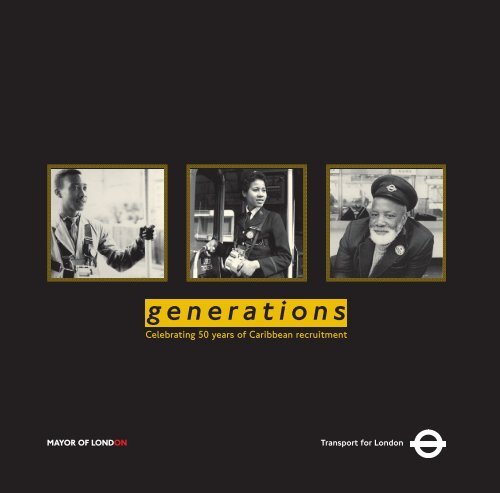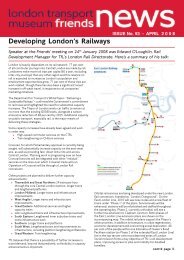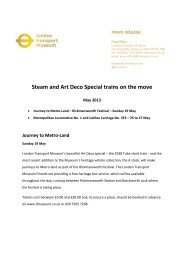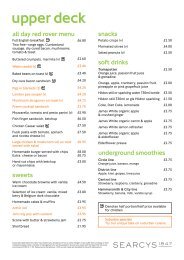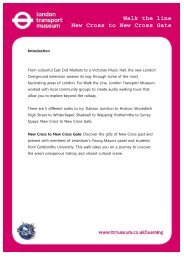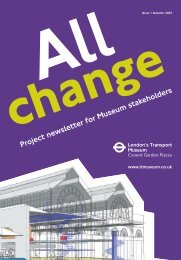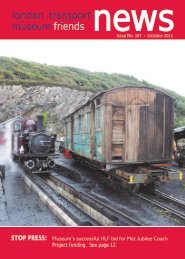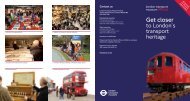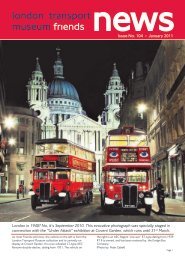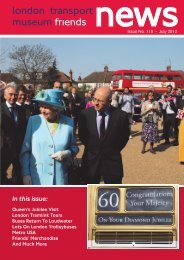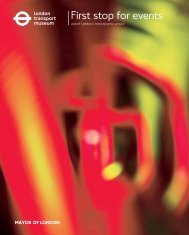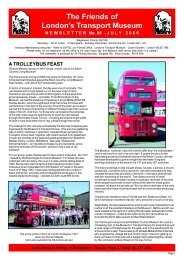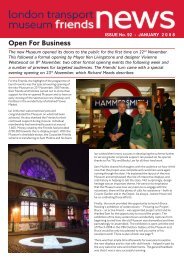Generations: celebrating 50 years of Caribbean recruitment
Generations: celebrating 50 years of Caribbean recruitment
Generations: celebrating 50 years of Caribbean recruitment
Create successful ePaper yourself
Turn your PDF publications into a flip-book with our unique Google optimized e-Paper software.
generations<br />
Celebrating <strong>50</strong> <strong>years</strong> <strong>of</strong> <strong>Caribbean</strong> <strong>recruitment</strong><br />
MAYOR OF LONDON Transport for London
London Underground trainees<br />
at the White City school, 1971<br />
2LTM<br />
1998/83758<br />
Foreword<br />
In response to labour shortages following the<br />
Second World War, London Transport had to<br />
look way beyond Britain's capital to keep<br />
London moving. At the invitation <strong>of</strong> the<br />
Barbados Government, it began a <strong>recruitment</strong><br />
drive in the <strong>Caribbean</strong> in February 1956. As a<br />
result, many thousands <strong>of</strong> people made the<br />
decision to emigrate from the <strong>Caribbean</strong> to<br />
Britain and begin a new life working on London’s<br />
public transport system.<br />
This is part <strong>of</strong> a history <strong>of</strong> migration which has<br />
seen employees join us from all over the world<br />
including; Ireland, the Indian sub-continent,<br />
Cyprus, Malta, and eastern Europe to name but<br />
few. At TfL we are extremely proud <strong>of</strong> this<br />
heritage and the contribution that our workforce<br />
has made to the rich diversity <strong>of</strong> London. Today<br />
it is the most diverse city in Europe, with 300<br />
languages spoken, over 14 faiths practised and<br />
42 communities <strong>of</strong> over 10,000 people born<br />
outside Britain. Leading London’s equality<br />
agenda is one <strong>of</strong> the Mayor <strong>of</strong> London’s key<br />
aims and underpins the work <strong>of</strong> Transport for<br />
London and the rest <strong>of</strong> the Greater London<br />
Authority family. It is therefore fitting that we<br />
should celebrate the contributions <strong>of</strong> the many<br />
women and men who came from the <strong>Caribbean</strong><br />
to work for London Transport half a century ago.<br />
This booklet celebrates the <strong>50</strong>th anniversary<br />
<strong>of</strong> that direct <strong>recruitment</strong> scheme in the<br />
<strong>Caribbean</strong>. It is part <strong>of</strong> a wider initiative – called<br />
the <strong>Generations</strong> project – that aims to preserve<br />
an oral and pictorial history <strong>of</strong> the people who<br />
joined us from around the world and the impact<br />
they had on London.<br />
To achieve this, TfL asked people to come<br />
forward and share their experiences <strong>of</strong> what life<br />
was like when they joined London Transport<br />
in the 19<strong>50</strong>’s and ’60’s. We also heard from<br />
current employees whose parents and other<br />
relations joined from abroad; these second<br />
generation employees have helped us bring our<br />
story up to date. We have also drawn on the<br />
London Transport Museum collection.<br />
Our job at TfL is to keep London moving every<br />
day, as well as planning and building the transport<br />
systems for the future. But we are keenly aware<br />
that everything we do today is only possible<br />
thanks to the efforts <strong>of</strong> previous generations.<br />
This booklet is an acknowledgement <strong>of</strong> that<br />
history and some <strong>of</strong> the people who made it.<br />
Peter Hendy CBE<br />
Commissioner <strong>of</strong> Transport<br />
Transport for London<br />
3
Canteen assistants training at Baker Street, 1967<br />
LTM 1998/85733<br />
contents<br />
Britain and the <strong>Caribbean</strong> 6<br />
Recruitment 9<br />
Arriving in London 10<br />
Working for London Transport 14<br />
<strong>Caribbean</strong> women at London Transport 18<br />
New communities, new friends 22<br />
Stay or return? Connections with home 26<br />
Changing times 30<br />
Biographies 34<br />
Platform for Art 45<br />
London Transport <strong>recruitment</strong> key dates 52<br />
Further reading 55<br />
Acknowledgements 58<br />
4 5
6<br />
Britain and the <strong>Caribbean</strong><br />
After the Second World War,<br />
London Transport (LT), like<br />
many other employers in the<br />
UK, had a severe <strong>recruitment</strong><br />
problem. It became especially<br />
hard to fill the lower grade,<br />
poorly paid jobs that could be<br />
dirty and difficult, involving<br />
shift work and long hours.<br />
In the British West Indies<br />
however, populations were<br />
growing and in some areas<br />
jobs were scarce. The strong<br />
migratory tradition in the West<br />
Indies prompted many to go<br />
abroad to study or seek work,<br />
looking for better pay and<br />
advancement. From the late<br />
1940s onwards thousands<br />
<strong>of</strong> <strong>Caribbean</strong> people made<br />
the long journey to the<br />
‘mother country’. As the first<br />
wave <strong>of</strong> <strong>Caribbean</strong> immigrants<br />
settled in London, some<br />
found work with LT.<br />
British passport, No 54301, issued to Mr R O Moseley in Barbados, 1959.<br />
Mr Moseley became a LT bus conductor.<br />
LTM 1995/570<br />
Advertisement for cheap passage to England. Jamaica, 19<strong>50</strong>s<br />
LTM 2006/15852<br />
7
Charles Gomm and Barbadian recruit, 1956<br />
LTM 1998/83756<br />
Recruitment<br />
London Transport (LT) advertised for staff in<br />
northern England and Scotland in an attempt to<br />
ease the staff shortages and by 19<strong>50</strong> had also<br />
begun to actively recruit in Ireland. But staff<br />
shortages continued and so in 1956, the<br />
organisation began to recruit further afield.<br />
At the invitation <strong>of</strong> the Barbados Government,<br />
men and women were recruited directly from<br />
Barbados to work as bus conductors, Underground<br />
staff and canteen assistants. As with other<br />
sponsored schemes run in conjunction with British<br />
Rail and the National Health Service, the Barbados<br />
government lent recruits the fare to Britain. This<br />
was then paid back over two <strong>years</strong>.<br />
LT recruited in Barbados until 1970, extending the<br />
scheme to Jamaica and Trinidad for a year in 1966.<br />
In later <strong>years</strong> the number <strong>of</strong> recruits fell, hampered<br />
by the restrictions imposed by the Commonwealth<br />
Immigration Act, 1962.<br />
Recruitment poster, Come and Join Us,<br />
artist unknown, 1953<br />
LTM 1983/4/6633<br />
‘As a youngster I was thinking <strong>of</strong> going to sea and went to the job<br />
exchange at home (Barbados). I didn’t want to go the USA, so I<br />
jumped at working for London Transport. The government paid for<br />
the fares then we would have to pay it back over time.’<br />
– Grantley Best, recruited in Barbados as a bus conductor, 1961<br />
8 9
Arriving in London<br />
‘I was so cold I slept in pyjamas,<br />
trousers and socks. The only<br />
thing I didn’t sleep in was shoes.’<br />
10<br />
– Sam Springer, came independently from Barbados to work as a station man, 1959<br />
The direct recruits from<br />
Barbados were met on arrival<br />
and taken to temporary<br />
accommodation close to<br />
their workplace in London.<br />
Some <strong>Caribbean</strong> men and<br />
women had served in Britain<br />
in the armed forces during<br />
the Second World War and<br />
so knew what to expect.<br />
Younger immigrants though<br />
were not prepared for the<br />
climatic and cultural<br />
differences they found.<br />
Many recruits found London<br />
a cold and unwelcoming<br />
place, with the additional<br />
difficulty in many cases <strong>of</strong><br />
adjusting from rural to city<br />
life. Some found it hard to<br />
find accommodation, and<br />
others were disappointed<br />
that they had to accept basic<br />
jobs in spite <strong>of</strong> their skills<br />
and education.<br />
‘When I first came<br />
over it was a bitter<br />
winter, 1963. It was<br />
icy and there were<br />
no buses or trains<br />
so I walked from<br />
Teddington to<br />
Kingston covered<br />
in snow.’<br />
– Vince Leacock, recruited in<br />
Barbados as a bus conductor, 1962<br />
Station staff clear snow at Leytonstone station, 1963<br />
Copyright TopFoto<br />
‘There weren’t many black people with<br />
houses and there weren’t many white people<br />
who would rent to black people. Even<br />
though there were “To Let” signs outside,<br />
the owner would say the room had gone.’<br />
– Chris Hope, recruited in Barbados as a bus conductor, 1961<br />
11
12<br />
‘The accommodation<br />
was heartbreaking<br />
at times... it deflated<br />
you. Word <strong>of</strong> mouth<br />
got you intoplaces…<br />
It was the first<br />
time I encountered<br />
prejudice. The<br />
word came up in<br />
a conversation on<br />
a bus and I looked<br />
it up.’<br />
– Vince Leacock, recruited in<br />
Barbados as a bus conductor,<br />
1962<br />
Left: New arrivals finding their<br />
way around London<br />
Copyright Museum <strong>of</strong> London,<br />
Henry Grant Collection<br />
Right: Looking for accommodation,<br />
Notting Hill, 1955<br />
Copyright Museum <strong>of</strong> London,<br />
Henry Grant Collection<br />
13
14<br />
Working for London Transport<br />
New recruits were quickly<br />
placed in jobs as bus<br />
conductors, station staff and<br />
canteen assistants, and in track<br />
maintenance and building work.<br />
Bus crews were trained at<br />
Chiswick and Underground staff<br />
at Acton. There were new skills<br />
to learn, a new currency to<br />
deal with and a strange city<br />
to become accustomed to.<br />
Many recruits were skilled and<br />
well educated but accepted<br />
lower status jobs, hoping to<br />
gain promotion or to move to<br />
other employment. Despite<br />
the many vacancies some<br />
white staff felt threatened by<br />
the newcomers. Trade unions<br />
at first tried to place a quota<br />
on the number <strong>of</strong> immigrants<br />
recruited and the type <strong>of</strong><br />
work available.<br />
Gradually the new workforce<br />
became an established part <strong>of</strong><br />
LT, and although some recruits<br />
left, those who remained<br />
slowly gained promotion within<br />
the company.<br />
‘At Chiswick Training Centre, when a<br />
conductor arrived late for the second time<br />
he was told by the inspector “Mr-, if you<br />
arrive late again we won’t want you”. He<br />
was not late again. Lateness was frowned<br />
upon, time was money. We had arrived!’<br />
– H A Downes, recruited in Barbados as a bus conductor, 1960<br />
‘There was one driver who was really bad<br />
to me… I went to the Supervisor and said<br />
I couldn’t work with him and I was<br />
leaving… The Superintendent asked if I<br />
thought the driver’s behaviour was because<br />
<strong>of</strong> my colour. I didn’t know. A few days<br />
later they told me he had been dismissed<br />
and asked me to stay. I’d been the fourth<br />
person to complain about the same<br />
driver… and they didn’t want to lose me!’<br />
– Desmond Dennis, came independently from Jamaica, worked for<br />
Central Distribution Services delivering supplies, 1956<br />
Staff working on track maintenance, 1957<br />
LTM 1998/27447<br />
15
16<br />
‘Promotion was <strong>of</strong>fered but when<br />
<strong>recruitment</strong> in the <strong>Caribbean</strong> began it did<br />
make things easier for those that were<br />
already here – we were not just sweeping<br />
the platform. The next stop was to become<br />
a guard then a motorman (train driver) then<br />
an inspector.’<br />
– Eric da Costa Thompson, came from Barbados to study and work, 1955<br />
Stephen Tharpe, came independently from Jamaica,<br />
pictured at Shepherd’s Bush Green, 1957<br />
Jack Hickman training Nona<br />
Roberts (boarding the bus)<br />
and other bus conductors for<br />
decimalisation, 1970<br />
LTM 2003/21206<br />
Staff at the food production centre in Croydon stir the Christmas pudding as the manager pours in<br />
the sherry, 1971<br />
LTM 2005/5576<br />
‘There was more <strong>of</strong> a relationship between us West Indians<br />
than across the board, but when you get to know people it<br />
was ok. The relationship between colleagues was good and<br />
we were helping each other.’<br />
– John Watson, came independently from Jamaica, worked as a station man, 1960<br />
17
<strong>Caribbean</strong> women at London Transport<br />
Merna Miller being crowned canteen queen, 1971<br />
LTM 1998/18599<br />
18<br />
From the beginning <strong>of</strong> the<br />
direct <strong>recruitment</strong> scheme, a<br />
small number <strong>of</strong> the recruits<br />
to the operating grades were<br />
women, coming to work as<br />
bus conductors, station<br />
women and canteen staff.<br />
At first it was LT policy to<br />
recruit single people. In reality<br />
many unmarried couples and<br />
single parents left children<br />
behind to be looked after by<br />
relatives until they could bring<br />
them over to England. So<br />
families were split in the<br />
search for a new life. Others<br />
brought children with them<br />
and tried to manage families<br />
and shift work.<br />
In 1968, London Transport<br />
estimated that they had<br />
about 9,000 black staff<br />
employed in a workforce <strong>of</strong><br />
73,000. This included around<br />
2,000 in departments such<br />
as catering, many <strong>of</strong> whom<br />
were women. As in the capital<br />
as a whole, West Indian<br />
foods and flavours were<br />
gradually introduced into<br />
the canteen menus.<br />
Nona Roberts, bus conductor, 1979<br />
‘When I started, we were doing 44 hours.<br />
Starting at 6.30am till 3.30pm. We worked<br />
on a rota basis. I got on with customers;<br />
sometimes people would complain<br />
about the portions. Most staff in the<br />
canteen were from Jamaica and Barbados<br />
and people from the different islands<br />
used to mix. It was hard work. They had<br />
beauty contests, and things like that used<br />
to help. The first canteen queen was from<br />
our canteen.’<br />
– Sybil Campbell, came independently from Jamaica, worked as a canteen<br />
assistant, 1961<br />
19
20<br />
‘The canteen ladies made rissoles from leftovers, and they were<br />
so delicious, everyone would go for them. Some <strong>of</strong> the guys<br />
would even buy them to take them home. They brought over the<br />
use <strong>of</strong> spices and different flavours and this was a definite change<br />
for us (white colleagues). And I remember they used to make up<br />
the most delicious puddings.’<br />
– Desmond Davies, bus driver, 1962<br />
‘I was living in Brixton. I rented a room with a woman I was<br />
working with. There was another woman from Trinidad who lived<br />
there. So when I would work early, she would look after my<br />
daughter and give her breakfast and when I worked lates, she<br />
would help her in the evening and put her to bed.<br />
– Ismay O’ Neil, came independently from Guyana, worked as a canteen assistant, 1962<br />
Canteen workers being<br />
trained at Baker Street, 1968<br />
LTM 1998/47267<br />
21
New communities, new friends<br />
<strong>Caribbean</strong> immigrants<br />
soon founded their own<br />
communities. Newcomers<br />
to London joined local<br />
churches or established new<br />
congregations. Clubs and<br />
‘blues dances’ were popular<br />
meeting places for some while<br />
others found friendship and<br />
support through their work,<br />
social and sports activities.<br />
Paul Charles, motorman and<br />
athlete, LT sportsman <strong>of</strong> the year,<br />
on front cover <strong>of</strong> LT magazine,<br />
March 1972<br />
LTM 1998/83759<br />
22<br />
London Transport also had a<br />
whole network <strong>of</strong> sports clubs<br />
and societies to join. Many<br />
Barbadians, with their well<br />
known cricketing tradition and<br />
skills, were in demand in local<br />
neighbourhood teams where<br />
they lived. They also met up<br />
with each other and socialised<br />
in London Transport teams<br />
such as the Central Road<br />
Services (CRS) cricket team,<br />
which included the best<br />
players from the bus garage<br />
teams. They were unbeaten<br />
in tournaments for 26 <strong>years</strong>.<br />
‘A friend <strong>of</strong> a friend got me my room and it<br />
was easy to make friends. There were loads<br />
<strong>of</strong> house parties. You had ska, twist and<br />
blue beats. Cars would pull up to you and<br />
they would ask if you were looking for a<br />
party and you’d say yes and they’d take you<br />
out and bring you back, with no strings<br />
attached. You were drinking your Cherry B,<br />
VP wine – you’d get up with a headache but<br />
you’d still go to work!’<br />
– Sybil Campbell, came independently from Jamaica, worked as a canteen<br />
assistant, 1961<br />
Staff from Peckham bus garage enjoying a day out, c 1957<br />
LTM 1999/9477<br />
Eugene Small, weightlifter (second from the right, back row)<br />
with LT staff boxing club at Camden gym, c 1967<br />
LTM 1998/83748<br />
23
‘There was cricket, snooker,<br />
24<br />
table tennis teams. We had<br />
a lot <strong>of</strong> house parties within<br />
the community, Jamaicans,<br />
Trinidadians, Guyanese<br />
and Dominicans.’<br />
– Lorenzo Daniels, recruited in Barbados as a bus conductor, 1960<br />
CRS Cricket team pose for the camera after winning another tournament, 1984<br />
LTM 2006/15877<br />
‘Most Barbadians were into cricket and Central Road Services cricket<br />
team had 3 or 4 venues such as Langley Park and Osterley. That’s<br />
how we passed our time. Apart from that we used to have parties<br />
over the weekend. The music originated from Jamaica with Reggae<br />
and Ska and Calypso from Barbados. The <strong>Caribbean</strong> islanders used<br />
to mix and you were glad to see other black people, to be honest.’<br />
– Chris Hope, recruited in Barbados as a bus conductor, 1964<br />
25
26<br />
Stay or return? Connections with home<br />
CRS cricket team on route to Barbados, 1975<br />
LTM 1998/83760<br />
‘I came over so young and settled down<br />
here. I made this my life. This is my home.<br />
Barbados is the place where I was born.’<br />
– Vince Leacock, recruited in Barbados as a bus conductor, 1962<br />
Many <strong>of</strong> those who came to<br />
Britain from the <strong>Caribbean</strong><br />
had expected to stay for a<br />
few <strong>years</strong>, but remained for<br />
most <strong>of</strong> their working lives.<br />
Many maintained strong links<br />
with home, as well as making<br />
new friends at work and in<br />
the community.<br />
While some returned to the<br />
<strong>Caribbean</strong>, it was difficult for<br />
others who had families with<br />
roots in Britain.<br />
On retirement some West<br />
Indians are torn between<br />
remaining with children and<br />
grandchildren born and<br />
educated in Britain, or<br />
returning to a very different<br />
<strong>Caribbean</strong> from the islands<br />
they left. Returning residents’<br />
associations have been set<br />
up in several islands to<br />
help people cope with the<br />
pressures and expense <strong>of</strong><br />
resettlement, and to keep<br />
a social network <strong>of</strong> friends<br />
and former colleagues.<br />
‘I said I’m going to give it five <strong>years</strong> here, and I told my mum I would<br />
stay five <strong>years</strong> and then I’d come back home. But the first time I’d<br />
be back down there (Barbados) was ten <strong>years</strong> later, and then I’d only<br />
gone because I was on a cricket tour. I captained them, we went on<br />
four or five tours to Barbados and that was good!’<br />
– Harold Blackman, recruited in Barbados as a bus conductor and captain <strong>of</strong> CRS cricket team, 1963<br />
‘Mum used to dry sorrel early and send it<br />
for me so I could have it for Christmas.<br />
We’d have roast pork. You’d go to the<br />
butchers and get goat meat. You’d have<br />
plum pudding and make it like home and<br />
steam it… My parents would collect<br />
newspapers, roll it and put it in the post<br />
because you didn’t have Jamaican news.’<br />
– Sybil Campbell, came independently from Jamaica, worked as a<br />
canteen assistant, 1961<br />
‘Some <strong>of</strong> the people<br />
from back then [in<br />
the canteens] are my<br />
friends up until now.<br />
And when I go back<br />
home to Grenville in<br />
Grenada, I meet up<br />
with them.’<br />
– Sanita Christopher, came<br />
independently from Grenada in 1964,<br />
worked as a canteen assistant<br />
27
28<br />
‘I took the whole family to Jamaica in 1983… but the children<br />
wanted to come back and go to school in London…’<br />
– Desmond Dennis, came independently from Jamaica in 1956, worked for CDS delivering supplies<br />
‘Dad took us all to<br />
Treasure Beach,<br />
Jamaica in 1983...<br />
it was very, very<br />
different living in the<br />
country… the school<br />
was much stricter,<br />
and things you take<br />
for granted like water<br />
you had to be careful<br />
with for cooking<br />
and everything.’<br />
– Deborah Dennis, bus driver,<br />
daughter <strong>of</strong> Desmond Dennis<br />
Aston Wilson, came to London in<br />
1951 to work as a bus conductor,<br />
back home in Jamaica, 1992<br />
LTM 1999/2472<br />
Desmond Dennis, formerly with CDS, preparing<br />
for a six month stay in Jamaica. At home in<br />
Kennington with his son, and friend Jenny Salmon<br />
(LT Catering), 2006<br />
Lloyd Ellis, former track worker, with his grandson<br />
in Jamaica, 1992<br />
LTM 2004/16833<br />
29
30<br />
Changing times<br />
Over the <strong>years</strong>, changing travel<br />
patterns and technological<br />
advances have meant that<br />
fewer staff were needed to<br />
run London’s public transport.<br />
In 1956, LT had a staff <strong>of</strong><br />
87,000. By the end <strong>of</strong> the<br />
twentieth century there were<br />
fewer than 35,000. During the<br />
last decades <strong>of</strong> the twentieth<br />
Harold Blackman and Carl Hoyte<br />
on the front cover <strong>of</strong> Metlife (staff<br />
magazine), holding photographs<br />
dating from their earlier days with LT<br />
Photo: Metroline<br />
century, restructuring and the<br />
privatization <strong>of</strong> services,<br />
including buses and catering,<br />
brought new working practices<br />
and with them, redundancies.<br />
Transport for London (TfL) was<br />
created in July 2000 as the<br />
integrated body for transport<br />
in the capital. In July 2003,<br />
London Underground Ltd<br />
(LUL) with its new Public<br />
Private Partnership (PPP)<br />
partners also became part<br />
<strong>of</strong> Transport for London.<br />
Today, TFL’s workforce<br />
includes a new generation <strong>of</strong><br />
black Londoners, some <strong>of</strong><br />
whom are sons and daughters<br />
<strong>of</strong> the first <strong>Caribbean</strong> recruits.<br />
‘Quite a few second generation kids ended<br />
up on the Underground. Dad’s retired<br />
now but my godfathers are still there.<br />
Working as an operator, I came into a<br />
male orientated world, but I think I had<br />
a better insight because <strong>of</strong> the people<br />
I grew up with. A big part <strong>of</strong> my life was<br />
around the Underground, back then it<br />
was a real community.’<br />
– Kelly-Anne Grosvenor, born in London, worked as a station<br />
assistant, 1998<br />
Lance Ramsay, General Manager <strong>of</strong> East London and Waterloo and<br />
City Lines, at home in 2006. His father and grandfather both worked<br />
on the Underground<br />
‘My mum didn’t see<br />
London Transport as<br />
a career. Initially she<br />
wanted me to be a<br />
computer programmer<br />
because it had more<br />
status than LT…<br />
I started as a bus<br />
conductor, became a<br />
driver but transferred<br />
to the Underground.’<br />
31
32<br />
‘Dad used to take me to the canteen at Thornton Heath bus garage<br />
on Saturdays because I liked the cherry pie there! I didn’t consider<br />
working for transport as a teenager. I wish I had now. I really, really<br />
like my job as a bus driver and look forward to going to work…<br />
There are some miserable people out there, but I believe you can<br />
make your own day.’<br />
– Deborah Dennis, bus driver, daughter <strong>of</strong> Desmond Dennis who worked for central distribution<br />
services at LT<br />
Andrew Smith, Instructor<br />
Operator, 2002. His parents<br />
emigrated from Jamaica and<br />
his father ran a business<br />
servicing black cabs.<br />
LTM 2005/15642<br />
Part <strong>of</strong> present day campaign to attract more women bus drivers into the industry<br />
Photo: London buses<br />
33
34<br />
Biographies<br />
Harold Blackman and Carl Hoyte Ismay O’Neil and Eugene Small<br />
Harold Blackman was<br />
recruited in Barbados in<br />
June 1963 as a bus conductor.<br />
He started at Harrow Weald<br />
garage, where he still works<br />
as a driver today. He was one<br />
<strong>of</strong> London Transport’s most<br />
successful batsmen in the<br />
Central Road Services (CRS)<br />
cricket team, winning over<br />
130 trophies.<br />
‘Back in our country as a<br />
youngster, you say “Morning”<br />
that’s how we were brought<br />
up. I was walking all the<br />
way to the garage from<br />
Hindes Road one Saturday<br />
morning and I was speaking<br />
to everybody and not one<br />
answered and I did look<br />
so silly!’<br />
Carl Hoyte was recruited as a<br />
bus conductor in May 1962 in<br />
Barbados. A good friend <strong>of</strong><br />
Harold’s, he was well known<br />
as one <strong>of</strong> the best bowlers in<br />
the CRS cricket team. Today<br />
he works as a bus operative<br />
trainer at Harrow Weald<br />
bus garage.<br />
‘For a start they make you<br />
think it (England) was a rich<br />
country, you earn lots <strong>of</strong><br />
money… that’s what all <strong>of</strong> us<br />
were here for, to earn lots <strong>of</strong><br />
money – my idea was – and<br />
the other fellows as well, was<br />
to come here for five <strong>years</strong>,<br />
get as much money as you can<br />
and go back... I’m still here<br />
after 44 <strong>years</strong> and I still ain’t<br />
got the money!’<br />
Ismay O’Neil came from Guyana in 1962 with<br />
her mother and siblings, to live with her aunt in<br />
Croydon. She applied to work as a LT catering<br />
assistant in 1968 and then moved on to work<br />
on the Underground where she met Eugene. She<br />
worked as a ticket collector at Victoria station<br />
until 1983.<br />
‘When we first came over we never knew we<br />
had to get special clothes for winter. One day I<br />
wasn’t well and had to go to hospital and had<br />
to walk in some shoes to get there and a white<br />
man stopped me and said “let me give you some<br />
advice… next time, always get a decent pair <strong>of</strong><br />
shoes and socks.”’<br />
Eugene Small flew to London to start work as a<br />
bus conductor, when he was recruited in April<br />
1961. He then transferred to the Underground,<br />
where he worked his way up to become manager<br />
<strong>of</strong> Brixton station and also Duty Manager <strong>of</strong> the<br />
Vauxhall Group, until his retirement in 1995.<br />
‘I was more scared <strong>of</strong> the Teddy Boys when<br />
going home at about 1 or 2 o’clock in the<br />
morning. I knew a colleague… a ticket<br />
collector… and a group <strong>of</strong> 12 came through,<br />
he confronted one <strong>of</strong> them who didn’t have<br />
a ticket and got beaten up!’<br />
35
36<br />
Jack Hickman, Phil Lawrence and Nona Roberts<br />
Jack Hickman joined LT in 1946 as a bus<br />
conductor after driving for the RAF during<br />
the Second World War. He ended up training<br />
thousands <strong>of</strong> conductors and direct recruits<br />
at Chiswick Training School. He soon became<br />
Chief Instructor and retired in 1985.<br />
‘The trainee conductors did 3 days at Chiswick,<br />
5 days at the garage and another 2 days back<br />
with us. The Barbadians had one extra day<br />
which we called the Geography bus! They had<br />
a whole day and stopped somewhere for their<br />
meal relief. It gave them an idea <strong>of</strong> the size<br />
<strong>of</strong> London.’<br />
Phil Lawrence trained as a bus driver in 1974 to<br />
work at Peckham garage. Throughout his career,<br />
he became a Senior Driving Instructor for LT and<br />
is still a trainer today for East Thames buses.<br />
From 1976 to 1979, he worked as a crew with<br />
conductress, Nona Roberts.<br />
‘The instructors were always immaculately<br />
dressed. Their shoes were toe-capped and they<br />
were so shiny, you could see your reflection and<br />
comb your hair in them!’<br />
Nona Roberts came from St Ann’s, Jamaica in<br />
1959 and started working as a bus conductor<br />
from 1965 to 1994. She was trained by Jack<br />
Hickman at Chiswick and later worked with Phil<br />
Lawrence for three <strong>years</strong>. They still remain good<br />
friends today.<br />
‘He (Phil) was marvellous. He was ever so good<br />
to me. Him and his dad would come and pick<br />
me up when I was still in my rollers at 3 or 4 in<br />
the morning.’<br />
37
38<br />
Lance Ramsay Lorenzo Daniel<br />
Lance Ramsay emigrated to<br />
England from Grenada with his<br />
family as a five-year old child<br />
in 1965. He started working for<br />
LT as a bus conductor in June<br />
1983 and then went on to<br />
work for the Underground,<br />
following in his father’s<br />
footsteps. Today, he is General<br />
Manager <strong>of</strong> the East London<br />
and Waterloo & City Lines.<br />
‘All I remember is that mum<br />
was in the NHS and dad was a<br />
driver at east Finchley, then he<br />
became a supervisor. At the<br />
time my granddad was a ticket<br />
collector at Osterley. I was<br />
always baffled because he was<br />
well-respected in Grenada – I<br />
remember a photo <strong>of</strong> him in<br />
his clothes and gun by his side<br />
– then all <strong>of</strong> a sudden he was<br />
in a ticket collector box in<br />
Osterley. I didn’t understand<br />
the dynamics at all.’<br />
‘I became duty manager…<br />
I was well known for my<br />
dreadlocks. I was outspoken;<br />
I had attitude, so I was well<br />
known. If there was any<br />
friction, it was from my own<br />
people, when I got promoted<br />
to duty manager… They<br />
thought I cut <strong>of</strong>f my dreadlocks<br />
because I got the duty manager<br />
job but the truth is one<br />
dreadlock fell out at a party.’<br />
Lorenzo Daniel, was recruited<br />
in Barbados, and started work<br />
in July 1960. Training first as<br />
a bus conductor in Balham,<br />
south London, he is now an<br />
inspector controller for bus<br />
routes 72 and 283.<br />
‘My objective was to watch<br />
and learn. We came from the<br />
same culture... the British<br />
culture… I watch and see how<br />
people operate, for example,<br />
the English mannerisms,<br />
because I didn’t know anything<br />
about how they operate.’<br />
‘At Christmas I would go to<br />
friends’. The first year I stayed<br />
at home. I had to learn how to<br />
cook. It wasn’t like Christmas<br />
the first two <strong>years</strong>. The ladies<br />
I knew from back home came<br />
over and I would go and visit.’<br />
39
40<br />
Linford Wong and John Mascoll Ralph Straker<br />
Linford Wong left Clarendon,<br />
Jamaica, in December 1960,<br />
to start a new life in Kilburn,<br />
north London. Applying<br />
for a bus driver vacancy at<br />
Cricklewood garage when<br />
he arrived in the country, he<br />
trained at Chiswick and drove<br />
for LT until his retirement<br />
in 1987.<br />
‘I really did enjoy it and was<br />
easy for me to adapt and<br />
make friends… People come<br />
and people go, so you just<br />
tried to get on with everyone<br />
because you were living in a<br />
strange country.’<br />
John Mascoll, was 20-<strong>years</strong><br />
old when he boarded the<br />
plane for England in January<br />
1965. Leaving Barbados on<br />
the Sunday, he was at White<br />
City by the following Tuesday,<br />
training to work on the<br />
Underground. He started as<br />
a station man, became a<br />
guard, then a driver and<br />
eventually a Duty Station<br />
Manager at Edgware until he<br />
retired in June 2005.<br />
‘The city was disgusting<br />
and grimy. The grime on<br />
the building was black<br />
and it reminded me <strong>of</strong> the<br />
smoke coming out <strong>of</strong> the<br />
sugar factories at harvest<br />
time. London today bears<br />
no resemblance.’<br />
‘I found people ok. It was<br />
interesting that they wanted<br />
to know who you were and<br />
where you come from. The<br />
geography was bad – I told<br />
them (people) I came from<br />
Barbados and they’d ask me<br />
where in Jamaica is that?’<br />
Ralph Straker was born in<br />
St Michael, Barbados and at<br />
21-<strong>years</strong> old, was recruited<br />
to work as a bus conductor<br />
for LT at Finchley bus garage<br />
in 1956, where he worked for<br />
nine <strong>years</strong>. He later worked as<br />
Community Relations Advisor<br />
in Hackney and Race Relations<br />
Advisor in Haringey. He now<br />
serves as a verger for St Paul’s<br />
Church in Finchley and<br />
St Clements Danes.<br />
‘For the (LT aptitude) test,<br />
we had to do a written test<br />
in arithmetic, and I can’t<br />
remember if we had to do<br />
an English test… but the<br />
arithmetic didn’t come as<br />
a problem for us because<br />
at school, although we used<br />
dollars, at every level at<br />
school we had to calculate<br />
how to change pounds,<br />
shillings and pence into<br />
dollars and the reverse.’<br />
‘Oh, I’m ready to retire<br />
tomorrow morning and I have<br />
a house already waiting on me<br />
there. But my wife isn’t quite<br />
ready yet. She’s waiting on the<br />
grandchildren… I am waiting<br />
to put my foot on the sands<br />
and sip my rum punch. I’m<br />
looking forward to the day<br />
when we can do that.’<br />
41
42<br />
Stephen Tharpe Sybil Campbell and Sanita Christopher<br />
Stephen Tharpe came from<br />
Jamaica in 1956 and initially<br />
trained as a psychiatric<br />
nurse. He soon left to work<br />
on the Underground as a<br />
signalman and went on to<br />
become an executive assistant<br />
in staff relations for London<br />
Underground at 55 Broadway.<br />
Two <strong>of</strong> his sons currently<br />
work for TfL.<br />
‘The reason I stayed for so<br />
long is when you get married<br />
and children start to appear,<br />
you sober up and start to<br />
think about laying down the<br />
roots and London Transport<br />
was that for me.’<br />
Sybil Campbell was born in<br />
Westmoreland, Jamaica,<br />
and travelled to England in<br />
December 1961 to join her<br />
cousin in West Kensington.<br />
Six months after arriving,<br />
she started working at LT<br />
as a catering assistant; a job<br />
she would stay in for over<br />
30 <strong>years</strong>.<br />
‘I had the choice <strong>of</strong> catering<br />
assistant and booking <strong>of</strong>fice<br />
assistant. The interviewer<br />
told me a lot <strong>of</strong> my people<br />
were working as catering<br />
assistants. I thought about<br />
the free uniform and free<br />
food, so I thought I should<br />
choose the canteen.’<br />
Sanita Christopher from<br />
Grenada took up a position<br />
as a machinist, when she first<br />
came to England in 1964.<br />
She then applied for a job at<br />
LT as a catering assistant in<br />
Hammersmith in 1975. She<br />
has also worked at canteens<br />
in Southall and finally Ashfield<br />
House, where she met Sybil;<br />
they have remained close<br />
friends for over 20 <strong>years</strong>.<br />
‘Ashfield House was very hard<br />
work. There were a lot <strong>of</strong><br />
people. You had to cook three<br />
main meals plus a vegetarian<br />
meal. You had to cook the<br />
gravy and vegetables and there<br />
was a snack bar, so you had<br />
to make sandwiches. You had<br />
to be quick and prepare stuff<br />
the night before and put it in<br />
the fridge – it was hard but<br />
very enjoyable.’<br />
43
44<br />
45
46<br />
Platform for Art<br />
Platform for Art<br />
commissioned artist<br />
Othello De’ Souza-Hartley<br />
and acclaimed writer<br />
Courttia Newland to work<br />
in collaboration with<br />
Transport for London staff<br />
past and present as part <strong>of</strong><br />
the <strong>Generations</strong> project.<br />
This commission, entitled<br />
Connected, has resulted in<br />
an exhibition at Westminster<br />
Underground station.<br />
Platform for Art invited four<br />
individuals to share their<br />
stories with the artist and<br />
writer. They journeyed with the<br />
participants to revisit and<br />
explore memories that had<br />
special meaning for them.<br />
Courttia wrote these<br />
memories as abstract ‘micro<br />
stories’ providing a fleeting,<br />
yet insightful glimpse into their<br />
personal and working lives.<br />
Live readings <strong>of</strong> the stories<br />
by actors, directed by<br />
Nadine Hoare also took place<br />
at Westminster Underground<br />
station ticket hall as tube<br />
customers looked on.<br />
The TfL staff that took part in<br />
the project do not know one<br />
another but are connected<br />
by their inspirational journeys.<br />
They have helped to staff<br />
the vital transport network<br />
that enables today's<br />
Londoners to make their own<br />
unique journeys.<br />
Leaflets with more information about this project and the stories in<br />
full are available in the ticket hall at Westminster Underground<br />
station. The exhibition is on show 5 December 2006 - 30 April 2007.<br />
Platform for Art is the art programme for London Underground.<br />
Find out more and leave your comments at tfl.gov.uk/pfa<br />
Cricket Driver<br />
I used to love watching Dad<br />
step up to bat. He would play<br />
for his workmates in the<br />
Underground Cricket Club<br />
from ’67 until ’96. There was<br />
a real community feel back<br />
then. There would be regular<br />
excursions, dinner dances,<br />
<strong>Caribbean</strong> food and kids<br />
playing. Everybody was<br />
your Mum and Dad because<br />
everyone was someone to<br />
you. We were all connected.<br />
Kelly-Anne Grosvenor<br />
Train driver 1999 - present<br />
47
48<br />
Canteen Queen<br />
We would have a big<br />
ceremony in a gigantic hall<br />
with hundreds <strong>of</strong> balloons,<br />
and all the London<br />
Transport bosses would<br />
judge. At the end <strong>of</strong> the<br />
night, the winner would get<br />
her sash, a tiara, and a<br />
prize. I always did want to<br />
be Canteen Queen.<br />
Sybil Campbell<br />
Retired catering assistant<br />
for TfL 1962 -1992.<br />
The Route Controller<br />
He stands in the midst <strong>of</strong><br />
channelled confusion, the<br />
wind in his hair, swift<br />
vehicles rushing past him<br />
on all sides, feet planted<br />
firm against concrete.<br />
He is the centre <strong>of</strong> his<br />
world. Around him, bodies<br />
and wheels turn in noisy<br />
revolutions, a ceaseless<br />
motion which has<br />
become the very rhythm<br />
he dances to.<br />
Vince Leacock<br />
Service controller, 267 bus<br />
route 1962 - present.<br />
49
<strong>50</strong><br />
The Brixton Rock<br />
I was a qualified train driver<br />
at Morden. On my first day<br />
I felt like an airline pilot! I was<br />
shivering with excitement<br />
and scared, but nothing bad<br />
happened… I moved up to<br />
become Station Manager at<br />
Brixton. It was very different<br />
back then. When I come back<br />
to Brixton I think it looks very<br />
impressive, even though<br />
everything's changed. I don't<br />
recognise anybody anymore.<br />
Eugene Small<br />
Retired Duty Station Manager<br />
1961 -1995.<br />
About the artist and writer<br />
Othello De’Souza-Hartley is an artist and has<br />
worked commercially as a fashion and portrait<br />
photographer. Recent commissions include a<br />
residency at The National Trust’s Sutton House<br />
to produce a film and photographic installation<br />
exploring <strong>Caribbean</strong> heritage and a solo<br />
exhibition at Camden Arts Centre in 2005. He<br />
is currently working on a portrait commission<br />
for the National Portrait Gallery.<br />
Courttia Newland is the author <strong>of</strong> three<br />
critically acclaimed novels, The Scholar (1998),<br />
Society Within (1999) and Snakeskin (2002). He<br />
has co-edited IC3: The Penguin Book <strong>of</strong> New<br />
Black Writing in Britain and is a co-founder <strong>of</strong><br />
the Tell Tales collective, a short story initiative.<br />
His own short stories have been published in<br />
many anthologies and several <strong>of</strong> his plays have<br />
been performed in venues all over London. A<br />
novella, The Dying Wish (Abacus) was published<br />
in 2006 as part <strong>of</strong> the Quick Reads Series and<br />
his first radio play, Hands, was broadcast on<br />
BBC radio 4 in April <strong>of</strong> the same year<br />
51
52<br />
London Transport <strong>recruitment</strong> key dates<br />
1946 - 1947<br />
1946 - 1947<br />
1949<br />
19<strong>50</strong><br />
19<strong>50</strong><br />
1951<br />
1952-3<br />
1954<br />
Women conductors and station staff recruited during the<br />
Second World war to cover absent male staff are dismissed.<br />
The pre-war staffing policy which allowed women in limited roles<br />
only is reinstated<br />
Only months after being dismissed, women are invited to return<br />
as conductors and station staff on a permanent basis. This is<br />
prompted by post-war staff shortages<br />
Staff shortages continue. The London Passenger Transport Board<br />
(LPTB) centralises <strong>recruitment</strong> and seeks recruits outside London<br />
in Scotland, Liverpool and Lancashire<br />
The <strong>recruitment</strong> drive is extended to Northern Ireland<br />
Staff are recruited from the disbanding Polish services at Whitley<br />
Camp, near Aldershot. ‘We took a large number <strong>of</strong> recruits in<br />
the Polish Army when it was being disbanded in 19<strong>50</strong>… and<br />
they were extremely good types. In fact I remember personally<br />
interviewing the previous Secretary <strong>of</strong> State for Poland for a<br />
booking clerk’s job!’ – Charles Gomm, Recruitment Officer LT<br />
War-time policy <strong>of</strong> employing women as conductors on equal pay<br />
with men resumes<br />
Recruitment in Eire begins<br />
Staff <strong>recruitment</strong> continues in the provinces and Northern Ireland.<br />
‘Intensive measures were taken to counteract the staff shortage.<br />
In addition to widespread advertisement <strong>of</strong> staff vacancies in road<br />
and rail vehicles and in stations and other premises owned by the<br />
Executive, and in the press for local requirements, staff were<br />
especially recruited in the provinces and Northern Ireland.’ –<br />
London Transport Executive (LTE) Annual Report 1954<br />
1956 7 Feb<br />
1956<br />
1962<br />
1963<br />
1963<br />
1964<br />
1965<br />
First Barbadians are recruited directly to LTE in Bridgetown,<br />
Barbados. Barbados Advocate, 7 February 1956<br />
Recruitment continues in Ireland<br />
Commonwealth Immigrants Act, 1962 is passed.<br />
Bus drivers are recruited in Malta. Fewer recruits are drawn from<br />
Barbados and Ireland.<br />
‘The <strong>recruitment</strong> <strong>of</strong> staff in Ireland and Barbados continued but<br />
on a reduced scale because the lack <strong>of</strong> drivers restricted the need<br />
for conductors. Early in the year, recruiting staff visited North-<br />
East England but despite heavy local unemployment the response<br />
was poor, largely, it is thought, because <strong>of</strong> housing in the London<br />
area. At the request <strong>of</strong> the Maltese Government, a visit was made<br />
to Malta in August and a small number <strong>of</strong> road and rail operating<br />
staff was engaged’ – LT Annual Report, 1963<br />
Small number <strong>of</strong> bus drivers and rail staff are recruited in Malta.<br />
Limited <strong>recruitment</strong> in Ireland, Barbados scheme continues.<br />
‘The <strong>recruitment</strong> <strong>of</strong> staff in Ireland continued, but few<br />
applications were received. Operating staff were again recruited<br />
in Barbados’ – LT Annual Report, 1964<br />
Commonwealth Immigrants Act 1962 imposes restrictions<br />
on recruiting in Barbados.<br />
‘Recruitment <strong>of</strong> rail and road staff in Ireland and Barbados<br />
continued: and catering assistants were also recruited in<br />
Barbados. Because <strong>of</strong> the small quota permitted under the<br />
Immigration Act, the number <strong>of</strong> selected applicants recruited<br />
from Barbados was greatly reduced towards the end <strong>of</strong> the year.<br />
This situation will continue so long as the present restrictions<br />
remain in force.’ – LT Annual Report, 1965<br />
53
54<br />
1966<br />
1966 30 November<br />
1967<br />
1968<br />
1968<br />
1970 October<br />
Direct <strong>recruitment</strong> scheme is extended to Trinidad and Jamaica.<br />
Limited entry due to Commonwealth Immigrants Act, 1962.<br />
‘The <strong>recruitment</strong> <strong>of</strong> staff from Barbados continued on a greatly<br />
reduced scale owing to the limitations imposed by the<br />
Commonwealth Immigrants Act 1962. Local <strong>recruitment</strong> <strong>of</strong><br />
selected applicants in the West Indies was extended to Trinidad<br />
and Jamaica, but no recruits from these schemes are expected<br />
before mid-1967. Recruitment from Ireland continued, though the<br />
number <strong>of</strong> applicants fell’ – LT Annual Report, 1966<br />
Barbados gains Independence from Britain<br />
Entry permits delay the arrival <strong>of</strong> staff from Trinidad and Jamaica.<br />
‘The <strong>recruitment</strong> <strong>of</strong> staff from Barbados and Ireland continued,<br />
but on a much reduced scale. Potential recruits accepted in<br />
Trinidad and Jamaica under arrangements made in 1966 were<br />
awaiting entry permits, and none <strong>of</strong> them arrived in this country<br />
during 1967’ – LT Annual Report, 1967<br />
Commonwealth Immigration Act 1968<br />
Reduced number <strong>of</strong> overseas recruits<br />
‘The <strong>recruitment</strong> <strong>of</strong> road and rail staff continued but on a much<br />
reduced scale’ – LT Annual Report, 1968<br />
Formal <strong>recruitment</strong> scheme in Barbados ends. Over 4,000 staff<br />
have been recruited from the <strong>Caribbean</strong> since 1956.<br />
Further reading<br />
All the items listed here can be found in the library at London’s Transport Museum.<br />
James Barry (et al…)<br />
Sorry no vacancies: life stories <strong>of</strong> senior citizens from the <strong>Caribbean</strong><br />
North Kensington Community Series, No.6, 1992<br />
British Transport Commission<br />
Annual reports<br />
1948-1953<br />
Dennis Brooks<br />
Race and labour in London Transport<br />
Oxford University Press, 1975<br />
Kaybee Browne<br />
The social aspect <strong>of</strong> colonial immigration from the West Indies to the UK between 1948-1962<br />
Dissertation for MA twentieth century historical studies degree, 1989<br />
The <strong>Caribbean</strong> at War<br />
North Kensington Community Series, No.5, 1992<br />
Madge Dresser<br />
Black and white on the buses: the 1963 colour bar dispute in Bristol<br />
Bristol Broadsides, 1986<br />
Nancy Foner<br />
Jamaica farewell: Jamaican immigrants in London<br />
Routledge and Kegan, 1971<br />
Peter Fryer<br />
Staying power: the history <strong>of</strong> black people in Britain<br />
Pluto Press, 1984<br />
55
56<br />
London Transport<br />
Annual reports<br />
1953-1970<br />
London Transport<br />
Staff magazines<br />
Nick Merriman (Ed.)<br />
The peopling <strong>of</strong> London: fifteen thousand <strong>years</strong> <strong>of</strong> settlement from overseas<br />
Museum <strong>of</strong> London, 1994<br />
Pamela Mordecai (Ed.)<br />
From our yard: Jamaican poetry since independence<br />
Institute <strong>of</strong> Jamaica Publications, 1987<br />
Susan Okokon<br />
Black Londoners 1880-1990<br />
Sutton Publishing, 1998<br />
Felicity Premru<br />
Sun a-shine rain a-fall: London Transport’s West Indian workforce<br />
London Transport Museum, 1994<br />
Felicity Premru<br />
Oral history at work: London Transport’s West Indian workforce<br />
in Business Archives Principles and Practice, No 67, May 1994, pages 57-71<br />
Samuel Selvon<br />
The Lonely Londoners<br />
Longman, 1956<br />
Samuel Selvon<br />
Moses Migrating (Longman, 1983)<br />
Moses Ascending (Longman, 1984)<br />
Tony Sewell<br />
Keep on moving: the Windrush legacy<br />
Voice Enterprises Ltd, 1998<br />
John Western<br />
A passage to England: Barbadian Londoners speak <strong>of</strong> home<br />
UCL Press, 1992<br />
Mary Williams<br />
Social and historical analysis <strong>of</strong> London Transport’s <strong>recruitment</strong> policy with regard to immigrants in<br />
the 19<strong>50</strong>s<br />
Unpublished, 1996<br />
Robert Winder<br />
Bloody foreigners: the story <strong>of</strong> immigration to Britain<br />
Little Brown, 2004<br />
Websites<br />
Connections: hidden British Histories<br />
www.connections-exhibition.org<br />
London’s Transport Museum, Sun-a-shine Rain-a-fall exhibition<br />
www.ltmuseum.co.uk/virtual/online.shtml<br />
Moving here<br />
www.movinghere.org.uk<br />
Library<br />
London’s Transport Museum<br />
39, Wellington Street<br />
London WC2E 7BB<br />
Tel: 020 7565 7280<br />
www.ltmuseum.co.uk<br />
Email: library@ltmuseum.co.uk<br />
57
Acknowledgements<br />
TfL’s Group Equality & Inclusion team, would like to thank all contributors for taking part in the<br />
<strong>Generations</strong> project. In particular we would also like to acknowledge the following contributors:<br />
Carl Hoyte<br />
Chris Hope<br />
Deborah Dennis<br />
Desmond Davies<br />
Desmond Dennis<br />
Elaine Williams<br />
Eric da Costa Thompson<br />
Eugene Small<br />
Grantley Best<br />
Herman Downes<br />
Harold Blackman<br />
Henderson Phillips<br />
Ismay O’Neil<br />
Jack Hickman<br />
Jenny Salmon<br />
John Mascoll<br />
John Watson<br />
Kelly-Anne Grosvenor<br />
Lance Ramsay<br />
Linford Wong<br />
Lorenzo Daniel<br />
Nona Roberts<br />
Phil Lawrence<br />
Ralph Straker<br />
Sam Springer<br />
Sanita Christopher<br />
Stephen Tharpe<br />
Sybil Campbell<br />
Vince Leacock<br />
Winston Brewster<br />
London’s Transport Museum<br />
Platform for Art<br />
Courttia Newland<br />
Othello De’Souza-Hartley<br />
Hayley Madden<br />
TfL Black Asian Minority<br />
Ethnic Staff Network<br />
TfL Group Archives<br />
The images reproduced on pages 12 and 13 are the copyright <strong>of</strong> the Museum <strong>of</strong> London, Henry<br />
Grant Collection; page 11 copyright <strong>of</strong> TopFoto. The images on pages 16 (Stephen Tharpe) and<br />
19 (Nona Roberts) were kindly donated by the contributors. The image on page 30 is copyright <strong>of</strong><br />
Metroline. The images and text on pages 47 to <strong>50</strong> are the copyright <strong>of</strong> Othello De’Souza-Hartley and<br />
Courttia Newland. The images on pages 31 and 33 are the copyright <strong>of</strong> Transport for London. All<br />
other images are the copyright <strong>of</strong> Transport for London and are from the collections at London’s<br />
Transport Museum.<br />
58<br />
59
60<br />
Produced by Group Publishing


